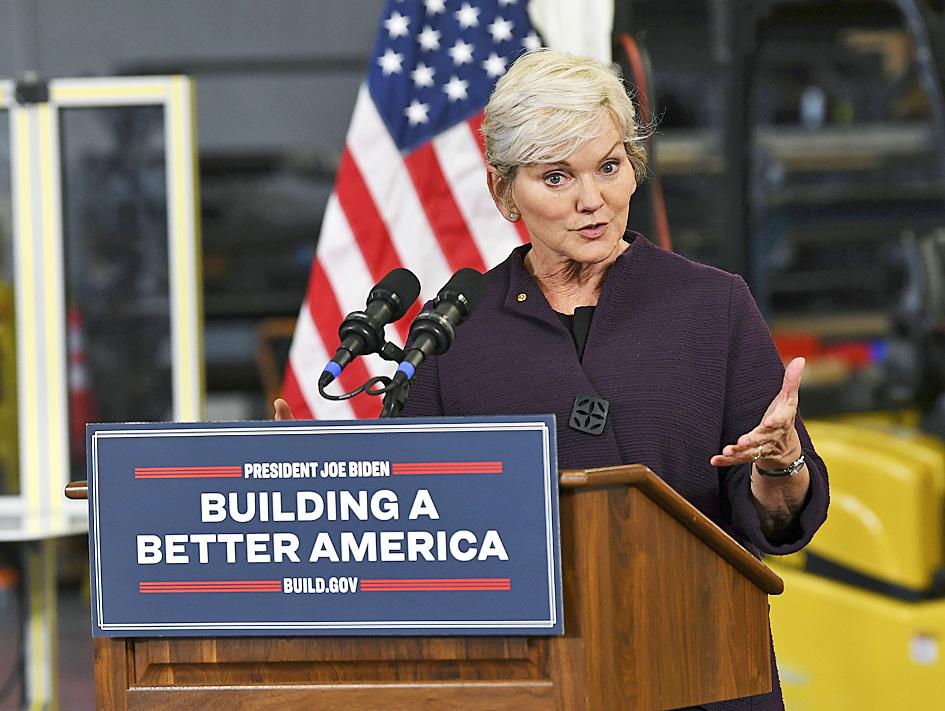US President Joe Biden’s administration is to allocate more than US$3 billion in infrastructure funding to finance electric vehicle (EV) battery manufacturing, US officials said on Monday.
The funds are to be allocated by the US Department of Energy from the US$1 trillion infrastructure bill Biden signed last year.
Among the initiatives would be processing of minerals for use in large-capacity batteries and recycling those batteries, the agency said in a statement.

Photo: AP / Detroit News
Biden wants half of vehicles sold in the US to be electric by 2030, a goal he hopes would boost unionized manufacturing jobs in key election battleground states, thwart Chinese competition in a fast-growing market and reduce climate-changing carbon emissions.
The administration is also positioning the measures as a step to secure energy independence and cut long-term inflationary pressures exacerbated by Russia’s Feb. 24 invasion of Ukraine.
“As we face this Putin price hike on oil and gas, it’s also important to note that electric vehicles will be cheaper over the long-haul for American families,” Mitch Landrieu, the White House infrastructure coordinator, told reporters in a briefing, referring to Russian President Vladimir Putin.
Ford Motor Co welcomed the announcement.
“This investment will strengthen our domestic battery supply chain, create jobs and help US manufacturers compete on the global stage,” Ford general counsel Steven Croley said in a statement. “We have a moment of opportunity to own this technology here in the US, and investments like the one announced today will help us get there.”
The latest funding would help establish and retrofit battery factories. The infrastructure law also allocated billions of US dollars more for the government to purchase electric buses and install EV chargers.
The administration has been collaborating with manufacturers, including Tesla Inc chief executive Elon Musk, General Motors Co CEO Mary Barra and Ford CEO Jim Farley.
However, the funds would not go toward developing new domestic mines to produce the lithium, nickel, cobalt and other high-demand minerals needed to make those batteries. Some of those projects face local opposition and are tied up in Biden administration environmental and legal reviews.
“These resources are about battery supply chain, which includes producing, recycling critical minerals without new extraction or mining,” Biden’s national climate adviser Gina McCarthy said. “So that’s why we’re all pretty excited about this.”
Biden in March invoked the Cold War-era Defense Production Act to support the production and processing of those minerals. Last week, he requested funding to support that initiative as part of a US$33 billion package on Ukraine-related initiatives.

NEW IDENTITY: Known for its software, India has expanded into hardware, with its semiconductor industry growing from US$38bn in 2023 to US$45bn to US$50bn India on Saturday inaugurated its first semiconductor assembly and test facility, a milestone in the government’s push to reduce dependence on foreign chipmakers and stake a claim in a sector dominated by China. Indian Prime Minister Narendra Modi opened US firm Micron Technology Inc’s semiconductor assembly, test and packaging unit in his home state of Gujarat, hailing the “dawn of a new era” for India’s technology ambitions. “When young Indians look back in the future, they will see this decade as the turning point in our tech future,” Modi told the event, which was broadcast on his YouTube channel. The plant would convert

‘SEISMIC SHIFT’: The researcher forecast there would be about 1.1 billion mobile shipments this year, down from 1.26 billion the prior year and erasing years of gains The global smartphone market is expected to contract 12.9 percent this year due to the unprecedented memorychip shortage, marking “a crisis like no other,” researcher International Data Corp (IDC) said. The new forecast, a dramatic revision down from earlier estimates, gives the latest accounting of the ongoing memory crunch that is affecting every corner of the electronics industry. The demand for advanced memory to power artificial intelligence (AI) tasks has drained global supply until well into next year and jeopardizes the business model of many smartphone makers. IDC forecast about 1.1 billion mobile shipments this year, down from 1.26 billion the prior

People stand in a Pokemon store in Tokyo on Thursday. One of the world highest-grossing franchises is celebrated its 30th anniversary yesterday.

Zimbabwe’s ban on raw lithium exports is forcing Chinese miners to rethink their strategy, speeding up plans to process the metal locally instead of shipping it to China’s vast rechargeable battery industry. The country is Africa’s largest lithium producer and has one of the world’s largest reserves, according to the US Geological Survey (USGS). Zimbabwe already banned the export of lithium ore in 2022 and last year announced it would halt exports of lithium concentrates from January next year. However, on Wednesday it imposed the ban with immediate effect, leaving unclear what the lithium mining sector would do in the